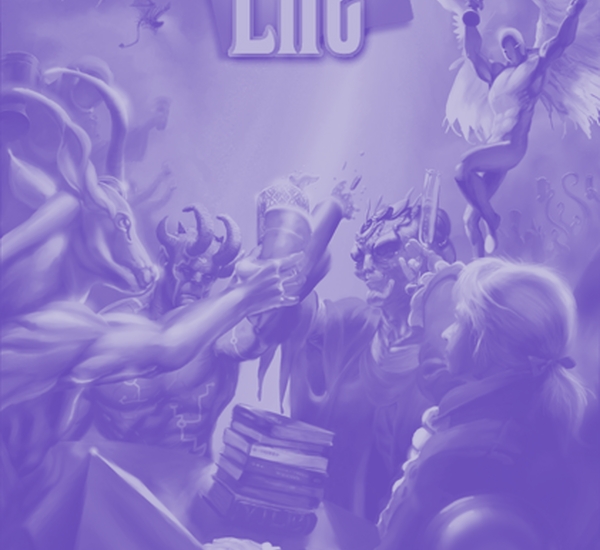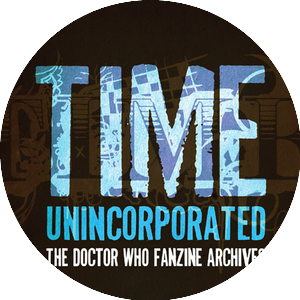Motivation
Craig Hinton was one of the bedrocks of Doctor Who fandom, and knew the behind the scenes gossip on every era of Who all the way up to the BBC Books era. He was always enormous fun to talk to online, and it came as a shock in December 2006 to hear that he had died. Everybody who had known him was keen for there to be an appropriate tribute, and Adrian Middleton stepped up to say he would edit a charity collection in memory of Craig.
The call went out for Doctor Who stories that had some connection to Craig – whether that was inspired by his work, or linked in some more personal ways. I very much wanted this collection to happen, and I knew I had the perfect story for it. In 2004, I’d decided to stop trying to get another Doctor Who book published, and had written a proposal to get all my lingering Who ideas out of my head. The pitch was simple: to commemorate the forthcoming anniversary of Robert Holmes’ death, I would write an Eighth Doctor novel featuring Jago and Litefoot, and a character from every Who story Holmes wrote. As this was the era of the Doctor Who books being unwilling to use old monsters, I knew it had no chance: the idea nagged at me, though, and I knew the only way to get rid of it was to write it down.
As Craig was the king of reusing Doctor Who continuity – “fanwank” was the term he coined for it – I asked him if he wouldn’t mind reading it. He did, and gave me his thoughts on it: he also told me that Justin Richards, the editor of Doctor Who Books, was a massive Robert Holmes fan and that I might as well send it in to him. I did, and it was rejected pretty instantly.
It was the only thing I could possibly submit.
Inspiration
The original story was inspired quite blatantly by Alan Moore’s League of Extraordinary Gentlemen, to the extent that I’d auditioned a few potential Leagues by looking at the characters available from a number of writers who’d written several episodes of Doctor Who. Robert Holmes, though, was the only real choice: the idea of having Jago and Litefoot – from Holmes’ The Talons of Weng-Chiang – in the story was just too much to pass up.
Getting the Story
The first thing I did was to revisit all of Robert Holmes’ credited Doctor Who stories: as script editor of the show, he had actually written an awful lot of things credited to other writers, but I thought to allow myself those stories as well would be cheating. The Talons of Weng-Chiang gave me my time period, and I knew my cast would have to include a Sontaran, an Auton and a Kroton. The process of trying to build these characters into a Holmes League meant that the actual story came pretty easily: it would follow the structure of team movies everywhere, and once I had my central villain and their motivation it was remarkably easy to write.
What I did notice when I was turning the proposal into a short story was that the story compressed remarkably easily. Set pieces and character meetings that had been scheduled to take chapters were rattled through in a few paragraphs: it made me think that possibly it hadn’t just been the use of old monsters that had made Justin Richards reject the original novel proposal.
What I also didn’t manage to do was find any way of getting Holmes’ first Doctor Who story, The Space Pirates, into the story. In the end, I admitted defeat and gave a character the same surname of one of the pirates, to suggest they were a distant ancestor. I’m not sure, though, that that was playing by the rules.
The Pitch
By the time I submitted my idea, it had become clear that Adrian was struggling with the numerous difficulties involved in getting a collection together and off to print. But Craig had been a part of a lot of people’s lives, and they were all keen that his tribute should go ahead: Jay Eales and David A. McIntee both stepped in as co-editors to give Adrian the benefit of their considerable experience, and take some of the burden off his shoulders.
My involvement in Shelf Life began with Adrian’s plea to bring in a third editor to help shepherd the book to completion. As I recall it, he was asking for someone with experience in these sort of books. As one of the very select group of people who’d done this (going back to helping out with the first Perfect Timing volume, co-editing the second and following that with the revised second edition of volume 1, and then culminating with Walking in Eternity), it felt as though Adrian was pretty much singling me out.
This meant that at the point I sent my story in, it was Jay who read it and responded. This worked very much in my favour, as I hadn’t had any contact with Adrian, whereas I had worked with Jay before and considered him a friend.
I remember enjoying it a lot. As a fan of the League of Extraordinary Gentlemen, I got all the references from the word go.
The story was accepted without any further need for rewriting.
What Happened Next?
The process of getting Shelf Life to print was, I understand, pretty fraught for the editors. The original intention was to publish in time for the first anniversary of Craig’s death, but in the end they had to work flat out in time to get it published for the second anniversary in 2008. As I understand it, Adrian had plans to produce at least two more volumes over the next two years, but these were to be without the help of Jay and David. They didn’t in the end appear, something which I think demonstrates just how difficult it is to get something like this from the initial idea to a final book.
Shelf Life didn’t make much of a stir when it did come out, but I am very proud to have been a part of it. Craig Hinton was an important part of the wider world of Doctor Who, and his passing couldn’t go without some comment. I’m glad that I managed to add my voice to those saying that he would be missed.
In terms of editing, I can’t call to mind any details seven years on, but as with other stories I’ve worked on for Dale, I have no horror stories to tell. I was able to get one of my favourite artists: D’Israeli to provide an illustration to accompany the story, and I think both story and illustration stand up among the highlights of the collection.


